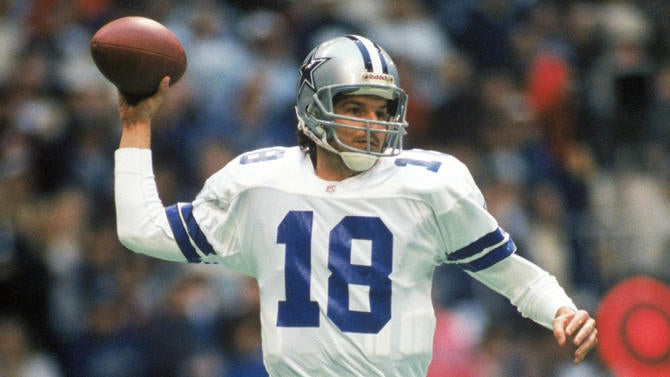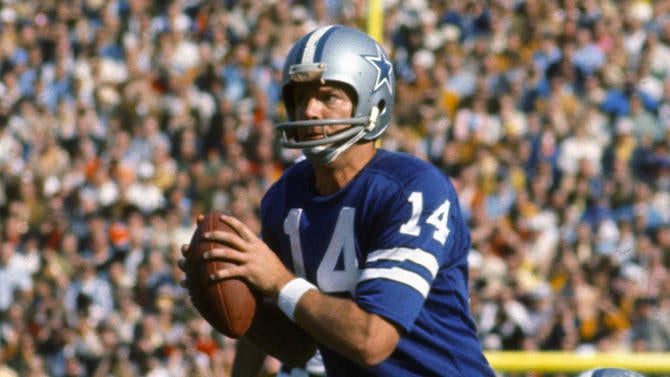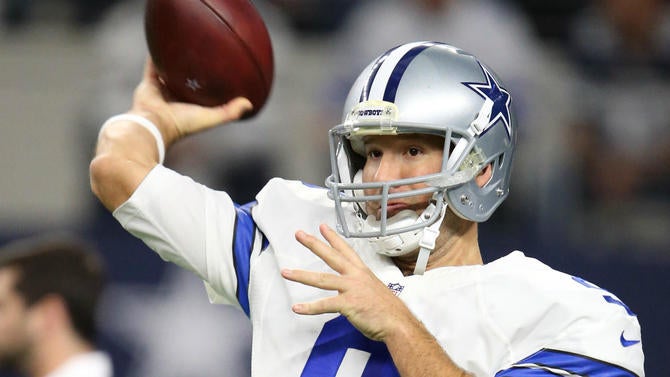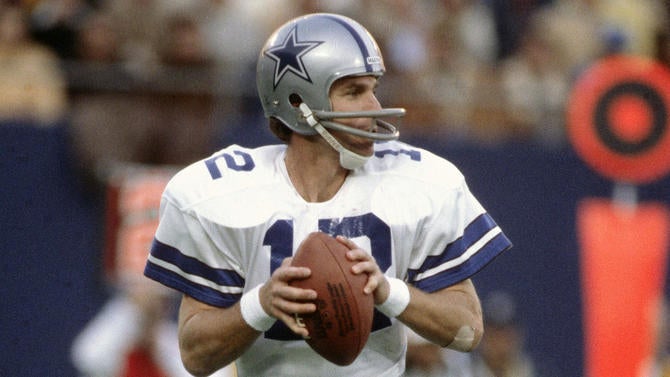Andy Dalton signing with the Cowboys is a win-win for both the quarterback and the organization. Dalton gets a chance to to return to his native state of Texas while joining a team with championship aspirations. The Cowboys get a proven backup quarterback who is more than capable of leading a team to victory if anything should happen to starter Dak Prescott.
While he is no longer a starter, Dalton is joining a Cowboys franchise that has enjoyed unique levels of success from their backup quarterbacks in the past. Several of those former backups helped contribute to championship-winning teams. A few of them carved out Hall of Fame careers.
Let's take a look at some notable quarterbacks Dalton is joining as Cowboys backups, as we rank them 1-5.

5. Bernie Kosar
Jimmy Johnson, who coached Kosar at the University of Miami nearly a decade earlier, and the Cowboys signed the former Pro Bowl quarterback after Bill Belichick and the Browns released him late in the 1993 season. In Week 11, Kosar came off the bench to lead the Cowboys to a five-point victory over the Cardinals, a win that helped the Cowboys win the NFC East as well as earn the No. 1 seed heading into the playoffs.
Kosar was again called into action after starting quarterback Troy Aikman suffered a head injury in the NFC Championship Game. Kosar, who led the Browns to three AFC title games during his time in Cleveland, helped the Cowboys punch their second consecutive ticket to the Super Bowl when he hit Alvin Harper for the game-clinching touchdown in Dallas' victory over San Francisco.
Aikman, despite still feeling the effects from his head injury, started -- and played well -- against the Bills in Super Bowl XXVIII. Kosar still got a chance, albeit briefly, to play in his first Super Bowl, taking a kneel down near the end of the Cowboys' 30-13 victory. The Super Bowl would be Kosar's last game with the Cowboys. The first overall pick in the 1985 draft, Kosar would spend three seasons at Dan Marino's backup in Miami before retiring after the 1996 season.

4. Danny White
While he would back up Staubach for four seasons, White was the Cowboys' starting punter during his first nine seasons with the team. He rarely saw time on offense during those first four seasons, however, with just one start under his belt upon replacing a retired Staubach as the team's starting quarterback entering the 1980 season.
White enjoyed immediate success as a starter. In 1980, White led the Cowboys to a 12-4 record and an appearance in the NFC Championship Game, a game they lost to their rival Philadelphia Eagles. In 1981, White led the Cowboys back to the NFC title game, where they lost to the San Francisco 49ers in a game that is remembered by Joe Montana's game-winning touchdown pass to Dwight Clark with under a minute left.
In 1982, White earned his first Pro Bowl selection while leading the Cowboys to yet another NFC Championship Game appearance. Once again, Dallas fell to a superior opponent, as the Cowboys were unable to stop John Riggins and the Redskins' punishing rushing attack. The Cowboys lost their next two playoff games with White, who retired after the 1988 season.
While his regular season numbers rival Staubach's, White's 5-5 playoff record (compared to Staubach's 11-6 postseason record) is the main reason why White's place in franchise history is somewhat forgotten.

3. Craig Morton
The fifth overall pick in the 1965 draft, Morton sat behind Don Meredith during his first four seasons in Dallas. With Morton on the bench, Meredith led the Cowboys to consecutive NFL Championship Game appearances in 1966 and '67. Both times, the Cowboys lost in dramatic fashion to the Packers, who would then go onto defeat the AFL champions in the first two Super Bowls.
Meredith, despite being only 31 years old, retired after a three-interception performance in Dallas' loss to Cleveland in the 1968 playoffs. The job as the Cowboys' starting quarterback then went to Morton, who led Dallas to an 18-5-1 record during his first two seasons as a starter. Morton's success helped the Cowboys win their first NFC title in 1970.
Despite his success, Morton lost his starting job to Roger Staubach during the 1971 season. While Morton was certainly an efficient player, Staubach's ability as a runner, as well as his ability to test defenses deep, ultimately led to the Cowboys enjoying even more success with Staubach under center.
After serving as Staubach's backup through the 1974 season, Morton enjoyed a late career resurgence with the Broncos, helping Denver win their first AFC title in 1977. In six seasons in Denver, Morton compelled a 41-23 regular season record that included three consecutive trips to the playoffs.
Shortly after his retirement following the 1982 season, the Broncos selected their next franchise quarterback, John Elway, who won two Super Bowls and five AFC titles before retiring after the 1998 season.

2. Tony Romo
A former undrafted rookie, Romo toiled for two seasons on the Cowboys' bench before finally getting his opportunity to play midway through the 2006 season. Romo, who replaced an ineffective Drew Bledsoe, immediately gave the Cowboys a spark while leading them to their first playoff berth in three years.
Over the next decade, Romo would lead the Cowboys to three more playoff appearances. In the process, Romo earned four Pro Bowl selections while becoming one of the league's most popular players. Romo also rewrote the Cowboys' record book, as he is currently the franchise's all-time leader in career passing yards (34,183) and touchdown passes (248). Romo's success in Dallas may one day earn him enshrinement in the Pro Football Hall of Fame, as Romo will be eligible for induction in 2022.
Like White, however, Romo's legacy includes playoff disappointment, as Romo won just two of his six career playoff spots. His two biggest playoff losses include a 12-17 loss to the Giants in the second round of the 2007 playoffs and Dez Bryant's controversial non-catch in Dallas' second round loss to the Packers in 2014.

1. Roger Staubach
In 1969, Staubach was a 27-year-old rookie who arrived in Dallas after completing his military service. While the former Heisman Trophy winner's talent wasn't lost on Cowboys head coach Tom Landry, Landry and the Cowboys were, at that time, committed to Craig Morton, who that season replaced Don Meredith as the team's starting quarterback.
While the Cowboys had success with Morton, the franchise, as they did with Meredith, continued to endure disappointing playoff losses. After falling to the Browns in the 1969 playoffs, Morton and the Cowboys fell to the Colts in Super Bowl V. Morton endured a rough outing against Baltimore's defense, throwing three interceptions that included a Mike Curtis' interception that set up the Colts' game-winning field goal with five seconds left.
By 1971, Staubach had grown tired of his role as Morton's backup. Landry, aware of Staubach's frustration and -- more importantly -- of Staubach's immense talent, started inserting Staubach into the lineup. But, to the frustration of both Staubach and Morton, Landry didn't commit to either quarterback as his starter, oftentimes changing quarterbacks between plays during the first half of the '71 season.
Finally, after an embarrassing loss in Chicago in Week 7, Landry decided to move forward with Staubach as his quarterback. The Cowboys' response to the news was jarring, as Dallas did not lose a game in which Staubach started during the '71 season. The move to name Staubach his starter paid off handsomely, as the Cowboys capped off the '71 season with their first Super Bowl victory, a 24-3 romp over the Dolphins.
Staubach remained the Cowboys' starting quarterback for the remainder of the decade, leading the Cowboys to three more NFC titles and another Super Bowl victory at the end of the 1977 season. Dallas' win in Super Bowl XII came against Morton, who enjoyed a career resurgence with the Denver Broncos.

















